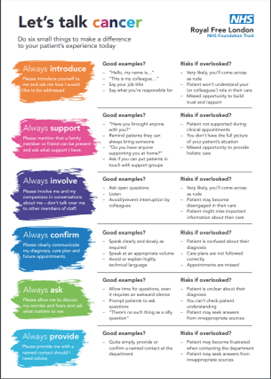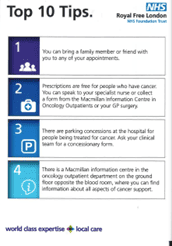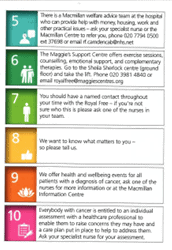Let's Talk Cancer!
Royal Free London NHS Foundation Trust

Contact: Azmina Rose - azmina.rose@nhs.net
Organisation
Winner – Cancer Experience of Care Award 2022
The Royal Free London NHS Foundation Trust (RFL) serves a local population of 1.6 million people and employs more than 10,000 staff. The Royal Free London NHS Foundation Trust (RFL) is one of the largest providers of cancer care in England, receiving the highest number of urgent suspected cancer referrals in London and second highest in England. In 2021 the Trust completed 2,830 first cancer treatments to newly diagnosed patients with various modalities including surgery, systemic anti-cancer therapy (chemotherapy and immunotherapy) and radiotherapy. These numbers will continue to grow as the incidence of cancer continues to rise. RFL hosts a portfolio of cancer tumour sites including specialist tumour sites, HPB, Kidney cancer and rare cancers such as neuroendocrine. RFL is an active recruiter to clinical trials and we offer anti-cancer treatment across all our sites which comprise Barnet hospital, Chase Farm Hospital, the Royal Free (Hampstead) hospital, and Finchley Memorial hospital. The size, scale and diversity of our cancer services, and the large geographical area we serve, adds complexity to our everyday service delivery and our quality improvement initiatives. Implementation of change and roll-out of new initiatives in a Trust of this size requires significant resource and time.
General Summary
Our INNOVATIVE “Let’s Talk Cancer!” initiative was developed in response to patient feedback received via the National Cancer Patient Experience Survey (NCPES) which told us that our Trust needed to improve its Communications. Patient and carer INVOLVEMENT guided our initiative and we worked very closely with patient and carer partners to construct 6 key foundational principles of good communications. These are summarised as:
Always Introduce.
Always Support.
Always Involve.
Always Confirm.
Always Ask.
Always Provide.
The 3 main OUTPUTS we created include:
- A pocket sized aide-memoire card for staff;
- A companion resource for patients called “TenTop Tips”,
- An INNOVATIVE online interactive staff training module https://rise.articulate.com/share/jV_hNUep9ZDKVxTkNhsTXO7BXOg5t1Hz
Internally, we launched these at DISSEMINATION roadshow events with support from senior Executive Trust LEADERSHIP. Our roadshow venues included the canteen, main hospital foyer, and other areas of the hospital with high staff and patient footfall.
Externally, we have presented our work at the pan-London lead Cancer Nurse Forum which has led to expressions of interest by other Trusts to duplicate and roll out our inventions at their own trusts. We are actively pursuing this opportunity for further TRANSFERABILITY and broader DISSEMINATION beyond our own Trust across London.

Rationale
The CONTEXT for this work is that our Trust had historically performed poorly in the National Cancer Patient Experience Survey (NCPES) when compared to other Trusts in London. NCEPS results had highlighted communications as an area for improvement together with a need to provide more understandable information to patients about anti-cancer treatment, and whether or not treatment is working.
These NCPES results inspired us to develop a series of quality improvement initiatives under the umbrella of “Let’s Talk Cancer!”. Our RATIONALE was that Communication and Behaviours can be influenced and modified at all levels, via learning, awareness and incremental step changes backed-up by positive reinforcement.
Planning
PLANNING: Patient and carer INVOLVEMENT guided our initiatives and we worked very closely with patient and carer partners to construct 6 key foundational principles of good communications. These are summarised as:
Always Introduce.
Always Support.
Always Involve.
Always Confirm.
Always Ask.
Always Provide.
DELIVERY:
OUTPUT 1. To assist staff to remember to use these principles in daily interactions with patients, we developed a pocket-sized ‘aide memoire’ card which could be clipped to staff lanyards and worn alongside NHS ID badges.
OUTPUT 2. In parallel, we developed a companion information resource for patients, which we called Ten Top Tips…
This outlined the key principles of communication that patients should be able to expect.
OUTPUT 3. We also developed an innovative “Let’s Talk Cancer!” online interactive training module for all staff (clinical and non-clinical) which features an animated (avatar) patient narrator to teach the 6 principles. Feedback from learners have complete the module have unanimously commented on how the interactive design is a fresh approach and NEW THINKING, when compared to more traditional forms of NHS online learning.
We launched these resources at DISSEMINATION roadshow events with support from senior LEADERSHIP across the Trust, including the Group Chief Executive, Site Chief Executive, medical Director and Director of Nursing. Our roadshow venues included the canteen, main hospital foyer, and other areas of the hospital with high staff and patient throughflow and footfall. The Ten Top Tips… resource for patients has been included in the information & support pack that every newly diagnosed cancer patient receives, with larger poster versions displayed in outpatient clinic settings.


Impact
OUTPUT 1. The IMPACT of the staff pocket-sized ‘aide memoire’ card for staff to wear on their lanyards along with their ID badges was measured by staff recall of the 6 principles: [Always Introduce. Always Support. Always Involve. Always Confirm. Always Ask. Always Provide.]
The RESULTS ACHIEVED through staff remembering, and implementing, and these 6 principles when they have been interacting with cancer patients has translated through into improvements in NCPES scores in the latest annual iteration of the survey. These NCPES improvements have been quantitative (higher scores) and qualitative (thematic analysis of the free-text comments have reflected greater satisfaction with staff communication.
OUTPUT 2. The IMPACT of the companion information resource for patients, Ten Top Tips… which summarises key principles of communication that patients should be able to expect has been evaluated by assessing patient knowledge of this resource. We include a copy of this flyer in every ‘new cancer diagnosis’ information and support pack. These packs are given to newly diagnosed cancer patients by their CNS (Cancer Clinical Nurse Specialist). To ensure that patients do give their attention to the Ten Top Tips flyer, the CNSs point it put when they talk the patient through the contents of the pack. Other items within the pack include a Macmillan booklet on Holistic Needs Assessments, the local Clinical team’s contact details etc. The RESULTS ACHIEVED through patients having this knowledge are measurable through adhoc feedback received in clinic via the Comments Box, and also in the patient satisfaction questionnaire which the individual tumour group teams send out to their patients. Since the Ten Top Tips flyer has been deployed, we have also seen a decrease in the number of complaints about staff communication and behaviours (direct to Oncology and via PALS).
OUTPUT 3. We also developed an innovative “Let’s Talk Cancer!” online interactive training module for all staff (clinical and non-clinical) which features an animated (avatar) patient narrator to teach the 6 principles. Feedback from learners have complete the module have unanimously commented on how the interactive design is a fresh approach and NEW THINKING, when compared to more traditional forms of NHS online learning. We are still working to have the module adopted as MaST (Mandatory and Statutory Training) and also to have it incorporated into Trust Corporate Induction. Our RESULTS ACHIEVED include having already rolled out this learning package to all staff undertaking Trust Nursing Induction, and all cohorts on the nursing preceptorship programme. At the time of writing, over 100 learners have completed the “Let’s Talk Cancer!” online interactive training module and feedback has been universally positive.
The Future
Internally, we launched these at DISSEMINATION roadshow events with support from senior LEADERSHIP across the Trust, including the Group and Site Chief Executives, Medical Director and Director of Nursing. Our roadshow venues included the canteen, main hospital foyer, and other areas of the hospital with high staff and patient footfall.
Externally, we have presented our work at the pan-London lead Cancer Nurse Forum which has led to expressions of interest by other Trusts to duplicate and roll out our inventions at their own trusts. We are actively pursuing this opportunity for further TRANSFERABILITY and broader DISSEMINATION beyond our own trust across London.
We expect that the efficacy of our interventions will be further evidenced via progressive and SUSTAINABLE improved annual National Cancer Patient Experience Survey results, improved patient satisfaction scores in our regular local tumour type surveys, audits, and a decrease in both frequency and absolute numbers of complaints about communication.
Standing Out
We have received feedback that the level of NEW THINKING and INNOVATION really STANDS OUT and is refreshing because our interactive online learning module is animated and the ‘story’ of an outpatient clinic appointment is told entirely through the patient’s eyes. The audio/script/narrative is voiced from the patient’s own perspective and this confers unique insight and in-depth understanding.
Direct quotes from a sample of learners who have completed the module https://rise.articulate.com/share/jV_hNUep9ZDKVxTkNhsTXO7BXOg5t1Hz
“My first impression was that it was good and powerful. I think it is most important to see it from a patient’s view, and this makes it more emotional and so memorable.” [Service user]
“I just went through the training module and it looks great, very professional and flows really well. I think it’s important to reflect on things that can easily happen (eg; speaking to another colleague or not introducing yourself) and how they can impact on patient’s experience.” [Trust Staff – Manager]
“I think the training is excellent and would be useful for junior nurses and even for more senior staff as a reminder. I do r3alise that showing it to senior staff may not work because they may feel they know it all and think the training is insulting.” [Patient of the hospital]
“I have completed the module and I have to say, it’s really very good. It gets the message across loud and clear, to all levels of staff, not just young trainee nurses. The audio scenarios are extremely thought provoking and really do help to put oneself into the patients frame of mind as well as see things from their point of view. The link to the cancer patient experience survey is good and the statistics in the survey are very useful, interesting and quite shocking in parts! The six key parts are a great way of breaking down every vital area which must be considered and applied when communicating and//or discussing things with the patient. They also carry the same ‘corporate image’ if you like, as the Royal Free Trust’s values (welcoming, respectful, reassuring and communicative) so there’s a nice internal flow going on, in relation to conveying ‘best practice’ etc.” [Carer of a patient of the hospital]
Key Learning Points
Implementation of change and roll-out of new initiatives such as “Let’s Talk Cancer!” in a Trust of this size requires significant resource and time. We would encourage others to carefully estimate the time (e.g. for project management) and resources that doing quality improvement to a high standard requires. Budget (or lack thereof) can also be a barrier. The most important LEARNING POINT we would share is how crucial patient / public engagement and involvement is. Likewise, buy-in from senior executive NHS leaders is essential. Finally, we would wish any others with an interest in doing something similar the very best of luck, and we would want to offer to share our learned expertise with them.
